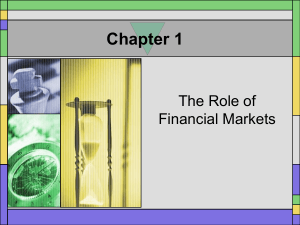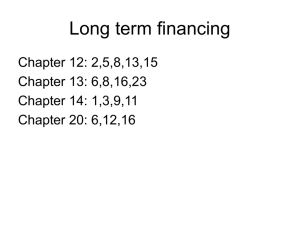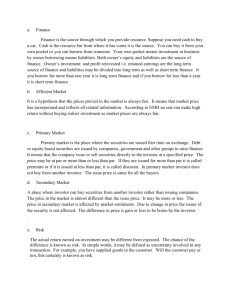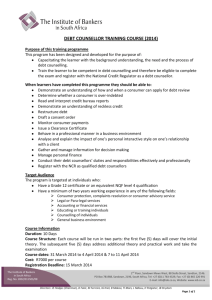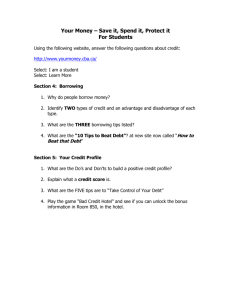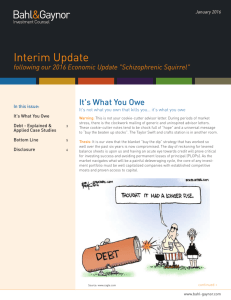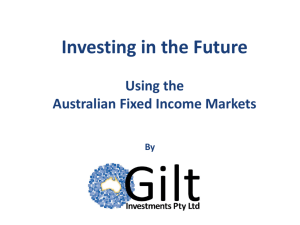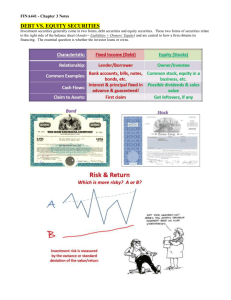Marketline Monthly - Cascade Investment Advisors
advertisement
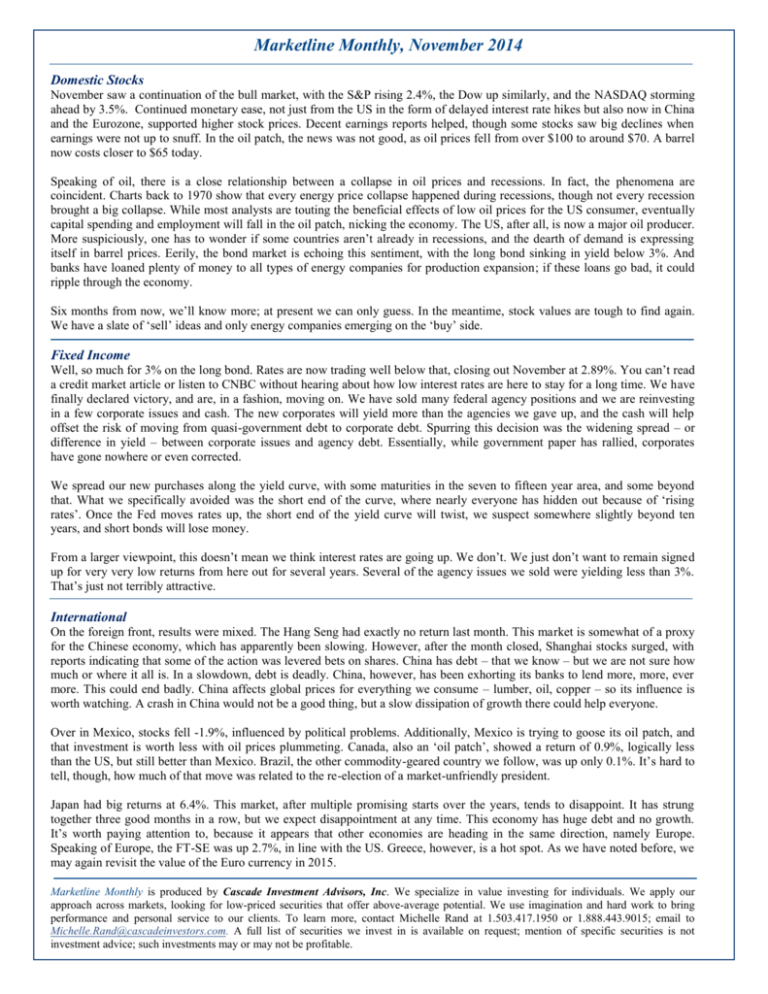
Marketline Monthly, November 2014 Domestic Stocks November saw a continuation of the bull market, with the S&P rising 2.4%, the Dow up similarly, and the NASDAQ storming ahead by 3.5%. Continued monetary ease, not just from the US in the form of delayed interest rate hikes but also now in China and the Eurozone, supported higher stock prices. Decent earnings reports helped, though some stocks saw big declines when earnings were not up to snuff. In the oil patch, the news was not good, as oil prices fell from over $100 to around $70. A barrel now costs closer to $65 today. Speaking of oil, there is a close relationship between a collapse in oil prices and recessions. In fact, the phenomena are coincident. Charts back to 1970 show that every energy price collapse happened during recessions, though not every recession brought a big collapse. While most analysts are touting the beneficial effects of low oil prices for the US consumer, eventually capital spending and employment will fall in the oil patch, nicking the economy. The US, after all, is now a major oil producer. More suspiciously, one has to wonder if some countries aren’t already in recessions, and the dearth of demand is expressing itself in barrel prices. Eerily, the bond market is echoing this sentiment, with the long bond sinking in yield below 3%. And banks have loaned plenty of money to all types of energy companies for production expansion; if these loans go bad, it could ripple through the economy. Six months from now, we’ll know more; at present we can only guess. In the meantime, stock values are tough to find again. We have a slate of ‘sell’ ideas and only energy companies emerging on the ‘buy’ side. Fixed Income Well, so much for 3% on the long bond. Rates are now trading well below that, closing out November at 2.89%. You can’t read a credit market article or listen to CNBC without hearing about how low interest rates are here to stay for a long time. We have finally declared victory, and are, in a fashion, moving on. We have sold many federal agency positions and we are reinvesting in a few corporate issues and cash. The new corporates will yield more than the agencies we gave up, and the cash will help offset the risk of moving from quasi-government debt to corporate debt. Spurring this decision was the widening spread – or difference in yield – between corporate issues and agency debt. Essentially, while government paper has rallied, corporates have gone nowhere or even corrected. We spread our new purchases along the yield curve, with some maturities in the seven to fifteen year area, and some beyond that. What we specifically avoided was the short end of the curve, where nearly everyone has hidden out because of ‘rising rates’. Once the Fed moves rates up, the short end of the yield curve will twist, we suspect somewhere slightly beyond ten years, and short bonds will lose money. From a larger viewpoint, this doesn’t mean we think interest rates are going up. We don’t. We just don’t want to remain signed up for very very low returns from here out for several years. Several of the agency issues we sold were yielding less than 3%. That’s just not terribly attractive. International On the foreign front, results were mixed. The Hang Seng had exactly no return last month. This market is somewhat of a proxy for the Chinese economy, which has apparently been slowing. However, after the month closed, Shanghai stocks surged, with reports indicating that some of the action was levered bets on shares. China has debt – that we know – but we are not sure how much or where it all is. In a slowdown, debt is deadly. China, however, has been exhorting its banks to lend more, more, ever more. This could end badly. China affects global prices for everything we consume – lumber, oil, copper – so its influence is worth watching. A crash in China would not be a good thing, but a slow dissipation of growth there could help everyone. Over in Mexico, stocks fell -1.9%, influenced by political problems. Additionally, Mexico is trying to goose its oil patch, and that investment is worth less with oil prices plummeting. Canada, also an ‘oil patch’, showed a return of 0.9%, logically less than the US, but still better than Mexico. Brazil, the other commodity-geared country we follow, was up only 0.1%. It’s hard to tell, though, how much of that move was related to the re-election of a market-unfriendly president. Japan had big returns at 6.4%. This market, after multiple promising starts over the years, tends to disappoint. It has strung together three good months in a row, but we expect disappointment at any time. This economy has huge debt and no growth. It’s worth paying attention to, because it appears that other economies are heading in the same direction, namely Europe. Speaking of Europe, the FT-SE was up 2.7%, in line with the US. Greece, however, is a hot spot. As we have noted before, we may again revisit the value of the Euro currency in 2015. Marketline Monthly is produced by Cascade Investment Advisors, Inc. We specialize in value investing for individuals. We apply our approach across markets, looking for low-priced securities that offer above-average potential. We use imagination and hard work to bring performance and personal service to our clients. To learn more, contact Michelle Rand at 1.503.417.1950 or 1.888.443.9015; email to Michelle.Rand@cascadeinvestors.com. A full list of securities we invest in is available on request; mention of specific securities is not investment advice; such investments may or may not be profitable.
